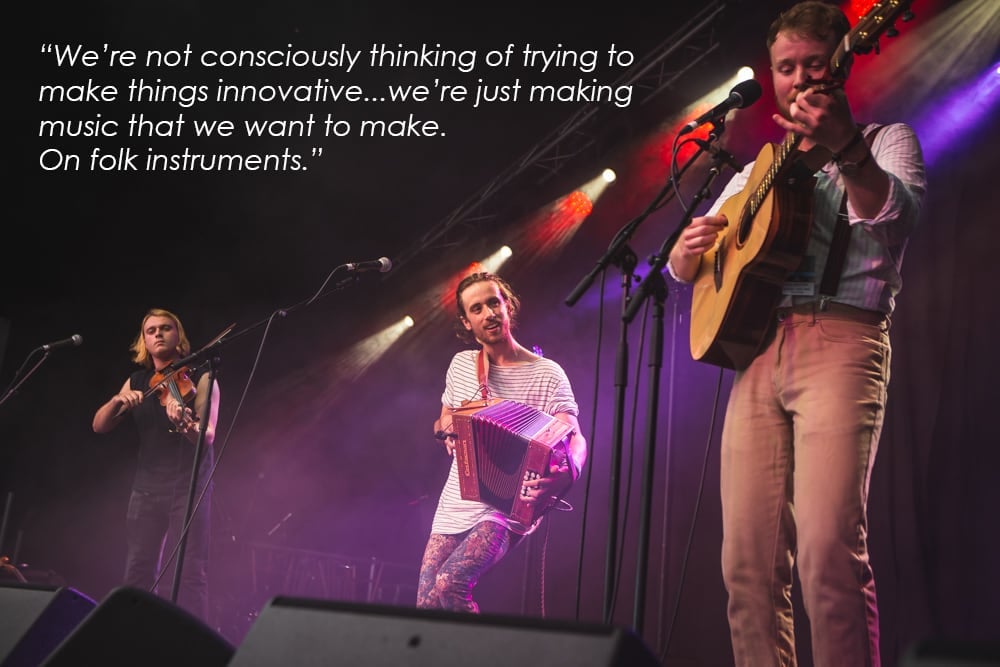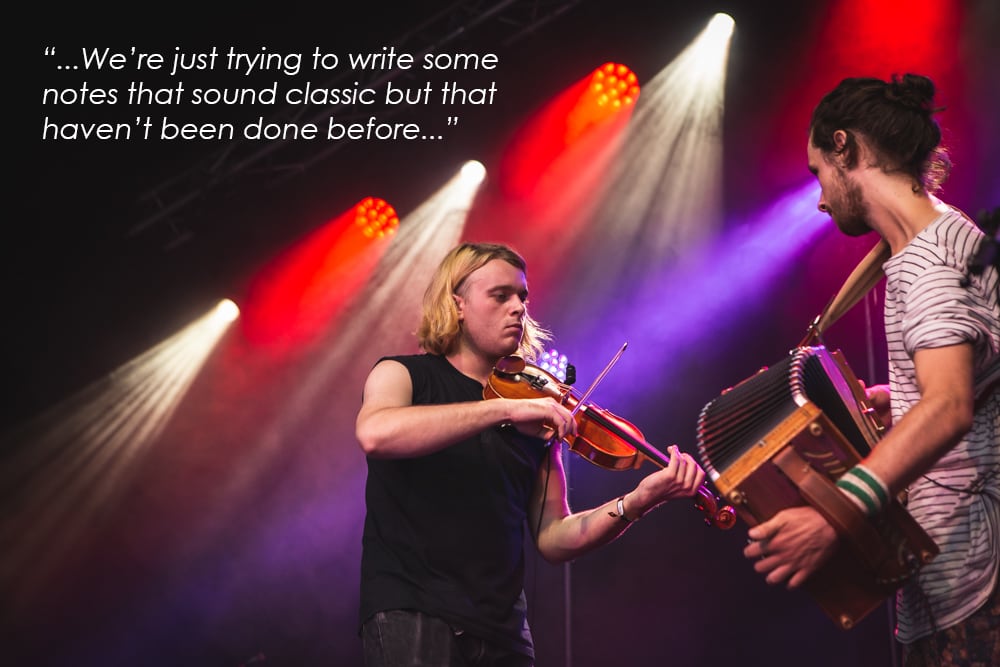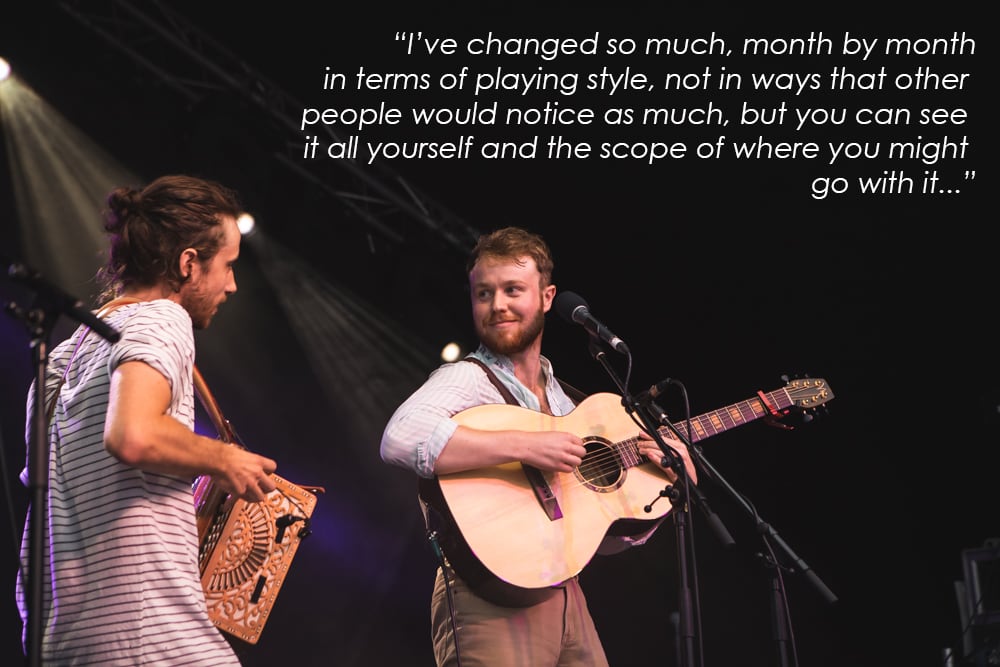There’s a funny thing about success. You can strive, toil and climb mountains in the pursuit of it, only to find that once you have it, there’s an even harder task ahead of you in terms of being able to sustain it.
For those that achieve some level of recognition early in their career, that challenge can be even more pronounced. Once you’ve reached a notable ‘high’, where do you go from there? How do you continue to maintain a personal sense of progression, particularly in folk music which for some can be a lifetime’s career?
For Tom Moore, Archie Churchill-Moss and Jack Rutter, ‘slowly and surely’ would likely form part of their answer. Seven years on from the release of their acclaimed self-named debut album and the receipt of a BBC R2 Young Folk Award, the trio have a charted a steady course. Choosing to spend intervening periods working apart on different musical projects, they’ve re-converged twice since 2011 to produce distinctly progressive albums; ‘II’ in 2015 and earlier this year ‘III’ (reviewed here), the latest chapter in the arc of the Moore Moss Rutter story.
The years that passed between albums, along with the personal growth experienced over that time, have clearly impacted the evolution of the trio’s musical style. It’s noticeable how the theme of change crops up throughout our discussion:
“The new album’s taken a slightly different turn to the other two albums” Archie reflects. “It’s more arranged. All the album apart from two tracks is written by us. That’s the direction we’ve been wanting to take things, producing a new body of contemporary English instrumental music. We’ve been trying to move away from ‘this is a tune, do a little bit, into another tune. We’re trying to think of pieces of music as a whole.”
“And a record as a whole actually” Tom adds, “In I and II there are lots of ideas that pop up, bits that are significantly different from other tracks on the album. This one sounds, I think, more coherent. It has more of a passage. That’s a really interesting thing for us; it’s another compositional tool to have a record as a whole journey.”
‘III’ is undoubtedly a remarkable piece of listening. Immediate and intimate in its production, the abundant enthusiasm the trio have for their music is evident in every tune. They credit the decision to work once again with Andy Bell for III as being central to the outcome:
“We really trust Andy’s ears” Archie explains. “He’s such an amazing producer, it’s good to have that external person who’s not really heard the new stuff, but who’s then immersed in it for that recording week. It’s good to just have that fresh set of ears, to give us a bit of perspective.”
Jack agrees; “It’s quite hard once you’ve been playing everything for so long to know what’s good and what’s bad. Sometimes he would just be like ‘That bit’s bad, take it out’ and we’d be like ‘Actually…you’re very right. I can’t believe I’ve been playing that for a year!’”
“We’ve got such a good working relationship with him” Archie laughs, “that he’ll just stop us in the middle of a take and say ‘Nah, do it again’. We really respect that honesty.”
I’m curious about how the trio feel about being described as ‘innovative’ and whether that’s a conscious aspect of their creative process:
“We’re not consciously thinking of trying to make things innovative” Archie reflects, “we’re just making music that we want to make. On folk instruments.”
“I think when it comes to writing” Tom explains, “we’re just trying to write some notes that sound classic but that haven’t been done before. I think that’s what everyone’s trying to do, isn’t it…where it might sound like it’s a thing, but no-one’s done exactly that before? Somebody will bring a tune, we’ll play it loads, each of us works out a part that we like, an arrangement and structure that we like…”
“A lot of stuff is edited throughout the gigging process” Archie continues. “If we’ve got a run of dates, things will change slightly from night to night; we’ll go ‘Jack, there was something you did there that really worked, let’s quickly work on that and make it into a thing.’ So that’s how it all slowly progresses.”
Tom adds further detail; “The thing that’s potentially really boring to everyone else is that once a piece of music is created and at least vaguely finalised, the thing that we tinker with the most is probably the overall speed. We can have a night where we’ll play one track much slower or faster and be like ‘that really worked’ or ‘that didn’t work’. We’re constantly tweaking that.”
Our conversation turns to the trio’s sense of progression following the release of ‘III’ and how they’ve changed as artists since the incarnation of Moore Moss Rutter, back when Archie and Tom were just 14 and Jack was 16.
“When you’re 14 or 15” Tom reflects, “unless you’re incredibly well listened, you just haven’t heard enough of what’s out in the world or explored music enough really to know what you want to do. At this point, I think we’re all listening to a much wider selection of stuff, across all music. Influences are coming in from all over the place, which is subtly affecting the way we do stuff.”
“The ways I’ve changed as a person and an artist” he continues, “can basically be put down to what I’ve been listening to. It’s crazy, the effect that one album can have on your life, your playing and everything. There are constantly things popping up that peak my interest. I listen to new stuff and have my mind blown quite regularly.”
Archie credits collaboration as a key contributor; “Since we first started we’ve all been playing with loads of other people and learning loads subconsciously just from working with other acts. I know I’ve learned loads from working with Sam (Kelly). He probably won’t like me saying this but he definitely approaches things from a more ‘pop’ perspective. I definitely think that’s affected my writing. You don’t really notice it and then you listen back to your work from a couple of years ago and you see ‘yeah I’ve really changed the way that I write’. I think it’s just from working with a broader spectrum of people.”
Jack has another angle on progression; “It’s all the tiny little things that add up to a massive whole. Like changing pick thickness; that tiny thing, over the course of four years, has resulted in me changing so much as a player…”
“You’ve just reduced your personality down to half a millimetre of plastic!” Tom laughs.
Jack laughs and continues undeterred; “It’s all those tiny little things, like watching other gigs and thinking ‘Ah, I could do that, or I might not do that.’ There’s not one thing, but when you put all those little things together they add up to a huge whole. Cormac Byrne said once that you don’t really know what kind of musician you are until you’re about thirty. At the time I heard that I thought ‘That’s rubbish; I’m twenty-two now and I know our sound’ but now I’m twenty-six, I think he’s completely right. I’ve changed so much, month by month in terms of playing style, not in ways that other people would notice as much, but you can see it all yourself and the scope of where you might go with it…all these little options and possibilities open up. So now I agree; we probably won’t know what sort of musicians we until we’re thirty.”
We move on to talking about the challenges of capturing and maintaining audiences through instrumental music;
“It’s something we’ve struggled with in the past” Archie admits, “because our thing has always been instrumental music. When we first started, there was definitely a smaller audience for English instrumental stuff. We’ve found that people are becoming more open. Audience tastes change as a whole. Maybe if we were still playing our old stuff, or in a similar style to our old stuff, it might go down completely differently to a couple of years ago because people have been exposed to loads more new music and so their tastes have changed.”
“I think we’re still trying to work out where we sit and who our audience is” Tom concurs. “It’s nice that we have pockets of people who like our music from lots of different scenes, but it’s also quite hard to surf. I think a lot of the time we play to folkies who perhaps don’t know as much about what’s happening in contemporary music. Then when we’ve played gigs at Southbank or somewhere like Cambridge folk festival where people are very aware of what’s going on; it’s a different conversation you’re having.”
Fortunately for those of us who love what they do, it seems that Moore Moss Rutter have no plans to pack away their instruments just yet;
“My thing has always been just writing” Archie grins. “I get a kick out of writing little melodies or little riffs. The thing I really enjoy about Moore Moss Rutter is that it’s an outlet for our writing. We’ve never said no to a tune that someone’s brought; we’ve always made it work in our own way and that’s the most exciting thing. It keeps it fresh, it keeps us motivated to keep writing. That’s just so important to me and (turning to Jack and Tom) I think to you too?”
“Definitely” Jack concurs.
“I really like providing tunes and writing tunes” Tom explains, “but I also like hearing what these two come up with and doing that messing around with all of our tunes. It’s something we have a creative investment in; not that we don’t have that with other bands that we play in, but if we’re playing with someone else it’s generally their project and you’ve kind of got to do what you’re told. With this, it’s really nice to have that investment and be pleased with the outcome when you’re doing gigs.”
Looking forward the trio are touring in November and then, as Archie explains, they plan to spend some creative time together over winter;
“We always go to Tom’s parents’ house in rural Norfolk and just get completely out of everywhere. We’ll just sit down and be like ‘Right, what have we all brought, let’s see what we can do’. It’s good when there’s no pressure of ‘we’ve got an album coming up, we’ve got to write stuff’; it’s more like ‘we’ve got this week, it doesn’t really matter what we come out with’”
For now, they have the tour to focus on. Performing primarily material from ‘III’ the band feel confident having gigged the set extensively throughout the Summer.
“I think we’ve got to a point with the material when we know we can be comfortable with it” Tom concludes. “We’re not stressing out over any bits of it, now it’s just the feel. It’s a really nice stage to be at. But no doubt we’ll write something else that’s just annoyingly hard in the next couple of months and we’ll be straight back to square one again.”
You can catch Moore Moss Rutter on tour throughout November:
Moore Moss Rutter Tour Dates
Friday, November 2 – The Live Rooms, Saltaire
Saturday, November 3 – Dunton Folk
Sunday, November 4 – Topsham Folk Club
Tuesday, November 6 – The Slaughtered Lamb, London
Thursday, November 8 – Ropetackle Arts Centre
Friday, November 9 – Whitchurch Folk Club
Saturday, November 10 – St Peter’s Church, Malvern
Sunday, November 11 – Mansfield Palace Theatre
Monday, November 12 – Ashby Parva
Tuesday, November 13 – The Stables, Milton Keynes
Wednesday, November 14 – West End Centre, Aldershot
III is out now via Hudson Records. Order it here https://mooremossrutter.lnk.to/Three
https://www.mooremossrutter.co.uk/




